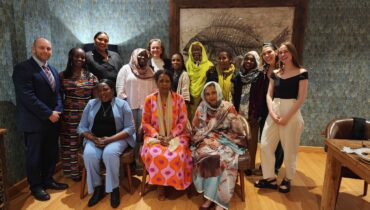“War worsens everything. Even if something was already at a low standard before the war, it has got even worse.”
Barack Malith Atem, a 55-year-old medical director at Kuajok hospital
When fighting broke out in Juba, South Sudan’s capital city, in December 2013, the hopes of many that the world’s newest democracy would be successful were dashed as conflict rapidly spread across the country. As fighting increased, South Sudan’s already weak healthcare infrastructure was further strained, almost to the point of collapse, exacerbating the unique vulnerabilities that women face in times of conflict. According to the United Nations Population Fund (UNFPA), even before the conflict began, South Sudan’s maternal and newborn deaths were among the highest in the world. Currently, South Sudan’s maternal mortality ratio is 730 deaths per 100,000 live births, which is high even among low-income countries. Unfortunately, a lack of primary health care services, particularly for women, has been exaggerated by the conflict. South Sudan has also seen an increase in the complications from childbirth because of decreased access to primary health services, and to hospitals and clinics for delivery.
With more than eighty percent of South Sudan’s healthcare provided by international non-governmental organizations, outbreaks of violence severely limit access to these organizations for people living in the affected area, worsening their lack of healthcare. When fighting erupts, medical services are often suspended and health centers destroyed, and medical professionals are sometimes forced to flee due to fear of danger. Additionally, violence can affect supply routes, which hampers the delivery of drugs and other medical supplies. According to a World Health Organization (WHO) medical officer in South Sudan, “the destruction of health facilities and displacement of health workers have stretched an already vulnerable health system to breaking point.” In February 2014, the WHO classified the health crisis in South Sudan as Grade 3 – the highest level of humanitarian emergency. There are only four other health crises of this magnitude: the Ebola epidemic in West Africa, and the humanitarian emergencies in Syria, Iraq and the Central African Republic.
With a weak healthcare system further strained by the conflict, women are particularly vulnerable. During conflict, women are often left alone to care for their families while their husbands are away fighting, leaving them at risk and their needs marginalized. In the case of South Sudan, this has caused women to wait longer to seek medical attention, as there is no one else to care for their children, and health centers are often miles away.
Since the conflict started, there has been an increase in sexual violence, as battles between Sudan People’s Liberation Army (SPLA) and Sudan People’s Liberation Movement/Army have resulted in cycles of revenge attacks and rapes. The health and social impacts of conflict-related sexual violence are both varied and severe. The strategic practice serves to humiliate women and often isolates them from their families and communities. Sexual violence can cause serious injury and spread sexually transmitted infections such as HIV/AIDS, and can result in pregnancy. After these violent encounters, women’s mental health can suffer, as well. Women often feel worthless and can experience anxiety, depression and post-traumatic stress disorder. These consequences are worsened in a conflict setting, as there are even fewer resources to provide mental health services for affected women, and there are often no mechanisms for achieving justice.
In addition, increased migration and displacement make it difficult for people who need medical attention to receive care. In South Sudan, more than 1.8 million people have been displaced due to the fighting, many of whom have been hiding in the bush to escape danger, making necessary medical care further out of reach and more dangerous to access. Conflict situations also increase the spread of communicable diseases, since women are typically on the frontlines of caring for those who are sick.
In conflict and crisis situations, there is also a decrease in food security, as entire planting seasons can be missed. According to the UN’s Food and Agriculture Organization, South Sudan is currently facing one of the world’s worst humanitarian and food security situations. Food insecurity causes increased rates of malnutrition, which is especially harmful to pregnant women as the risk of postpartum hemorrhage increases in malnourished women.
In the South Sudan conflict, women and girls have been especially vulnerable due to widespread gender inequality that is intensified by the collapse of social structures. This, along with decreased access to health services, has a negative impact on their health, and the health of their families. To improve the health situation for women in South Sudan, it is essential that both armed groups observe the latest cease-fire agreement, and the country begins building a healthcare infrastructure that will mitigate these gender-based vulnerabilities and provide care for those who need it.
About the Author
Margaret Dunne is a junior in the School of Nursing and Health Studies at Georgetown University, where she studies International Health and Bioethics. She has researched the impact of conflict-related sexual violence in South Sudan, and the UN mechanisms involved in trying to end the practice. She is interested in the intersection between health, ethics and international affairs.


